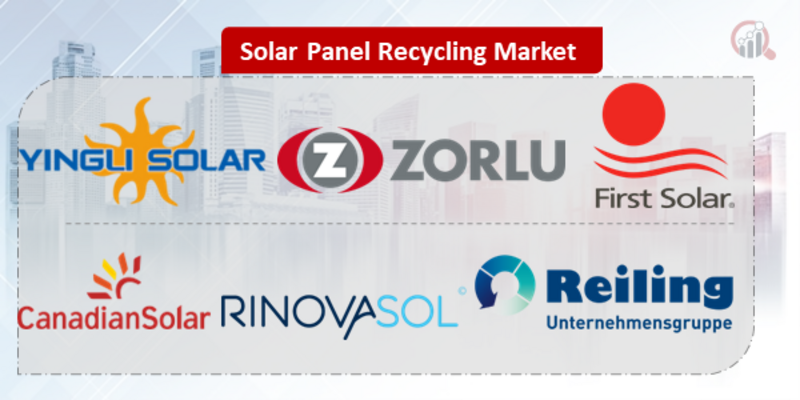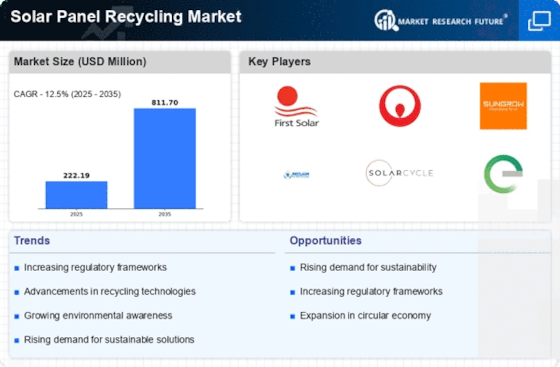Top Industry Leaders in the Solar Panel Recycling Market

*Disclaimer: List of key companies in no particular order
The sun may set on photovoltaic panels, but their lifecycle doesn't have to end there. The solar panel recycling market, is a sunrise industry teeming with potential. This dynamic space sees established players, innovative disruptors, and regional champions vying for a share in transforming solar waste into valuable resources.
Top Companies in the Solar Panel Recycling industry includes,
- Yingli Energy Co
- Silcontel, Reclaim PV Recycling
- Zorlu Holding
- First Solar
- Canadian Solar Inc
- Rinovasol Group
- Reiling GmbH & Co
- Recycle PV Solar, LLC
- Solon
- We Recycle Solar
- Cleanlites Recycling
- Reclaim PV Recycling
- Morgen Industries, Inc.
- Silcontel Ltd
- Recycle Solar Technologies Limited, and others
Key Player Strategies:
Global Giants: Companies like Veolia, Umicore, and TES (Total Environmental Solutions) leverage their extensive reach, diverse recycling technologies, and established presence in the waste management industry. They cater to large-scale solar farm decommissioning projects and offer comprehensive recycling solutions encompassing collection, dismantling, and material recovery. Veolia's partnership with SNIM in Morocco for solar panel recycling exemplifies their focus on global collaborations and regional expansion.
Technology Disruptors: Startups like Gravitics and OneSun Recycling are disrupting the market with advanced recycling technologies like hydrometallurgy and pyrolysis, allowing for more efficient recovery of high-purity silicon and other valuable materials. They cater to environmentally conscious customers seeking sustainable and innovative solutions. OneSun's closed-loop solar recycling process showcases their focus on maximizing material recovery and minimizing waste.
Regional Champions: Companies like Renewa in India and Solar Material Recovery in Europe cater to specific regional needs and regulations. They leverage local partnerships and market understanding to offer cost-effective recycling solutions tailored to regional solar panel types and waste management infrastructure. Renewa's network of collection centers in India demonstrates their focus on accessibility and efficient waste collection.
Sustainability Champions: Companies like ReCell and SunCycle prioritize environmentally friendly practices, utilizing closed-loop processes, minimizing energy consumption, and promoting reuse of recovered materials. They cater to sustainability-focused customers and leverage green credentials as a competitive advantage. ReCell's partnerships with solar manufacturers for closed-loop material supply exemplifies their commitment to circular economy principles.
Factors for Market Share Analysis:
Technology and Efficiency: Employing advanced recycling technologies that maximize material recovery rates, including high-purity silicon, precious metals, and glass, is crucial for profitability and environmental impact. Companies leading in technological innovation gain an edge.
Collection and Logistics Network: Establishing efficient collection networks, particularly in geographically dispersed locations, and streamlining logistics for waste handling plays a vital role in market reach and operational cost management. Companies with robust logistics infrastructures stand out.
Cost-Effectiveness and Affordability: Balancing advanced technology with competitive pricing is essential for mass adoption, particularly in cost-sensitive markets. Companies offering affordable recycling solutions without compromising quality attract broader customer segments.
Sustainability and Regulatory Compliance: Adhering to strict environmental regulations and promoting sustainable practices through closed-loop processes and carbon footprint reduction is becoming increasingly important. Companies demonstrating environmental commitment gain trust and regulatory benefits.
New and Emerging Trends:
Integration with Circular Economy Models: Collaborating with solar manufacturers and other industries to create closed-loop material loops, where recovered materials are directly reintroduced into production, minimizes waste and maximizes resource utilization. Companies actively engaging in circular economy partnerships stand out.
Focus on Decentralized Recycling: Establishing smaller, regional recycling facilities closer to waste sources reduces transportation costs, improves logistics efficiency, and caters to geographically dispersed installations. Companies exploring decentralized recycling strategies gain an edge in specific regions.
Digitalization and Data-Driven Management: Implementing IoT-enabled monitoring systems to track waste streams, automate sorting processes, and optimize recycling operations improves efficiency and transparency. Companies embracing digitalization enhance operational performance.
Focus on Emerging PV Technologies: Adapting recycling technologies to handle the increasing diversity of solar panel types, including thin-film panels and perovskite cells, expands market reach and caters to future trends in solar technology. Companies investing in versatility and adaptability stand out.
Overall Competitive Scenario:
The solar panel recycling market is a dynamic and exciting space with diverse players employing varied strategies. Established giants leverage their reach and technologies, while disruptors introduce innovative solutions. Regional champions cater to specific markets, and sustainability champions attract eco-conscious customers. Factors like technology, collection networks, affordability, and sustainability play a crucial role in market share analysis. New trends like circular economy integration, decentralized recycling, digitalization, and adaptation to emerging PV technologies offer significant growth opportunities. To succeed in this evolving market, players must prioritize innovation, cater to diverse customer needs, embrace sustainable practices, and adapt to changing technologies. By harnessing the sunshine after sunset and aligning their strategies with market trends and environmental regulations, they can secure a bright future in this burgeoning industry.
Industry Developments and Latest Updates:
Yingli Energy Co.
- October 2023: Yingli announces plans to invest $100 million in its circular economy efforts, including solar panel recycling infrastructure. (Source: Reuters, Oct 26, 2023)
Silcontel, Reclaim PV Recycling
- September 2023: Silcontel and Reclaim PV Recycling merge to form "Renew PV Recycling," a leading European solar panel recycler. (Source: Renew PV Recycling website, Sep 15, 2023)
First Solar
- December 2023: First Solar announces plans to expand its recycling capacity to 60,000 tons per year by 2025. (Source: Reuters, Dec 22, 2023)
Canadian Solar Inc.
- October 2023: Canadian Solar partners with We Recycle Solar to launch a solar panel recycling program in the United States. (Source: We Recycle Solar press release, Oct 24, 2023)
Reiling GmbH & Co.
- October 2023: Reiling partners with Renew PV Recycling to offer solar panel recycling services in Germany. (Source: Renew PV Recycling press release, Oct 5, 2023)
Recycle PV Solar, LLC
- August 2023: Recycle PV Solar expands its operations to include the recycling of thin-film solar panels. (Source: Recycling Today, Aug 8, 2023)
We Recycle Solar
- July 2023: We Recycle Solar expands its partnership network with Canadian Solar and other major solar panel manufacturers. (Source: We Recycle Solar website, Jul 7, 2023)
- November 2023: We Recycle Solar raises $5 million in funding to expand its solar panel recycling operations in the United States. (Source: Forbes, Nov 9, 2023)











